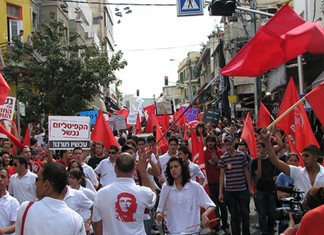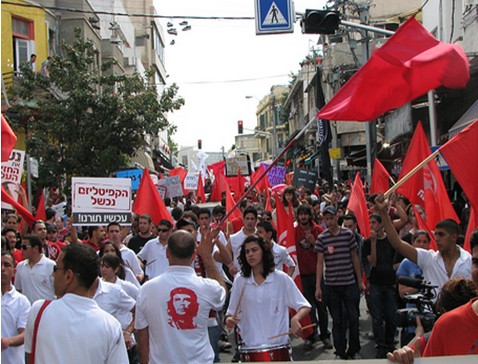
The Histadrut (General Federation of Labor in Israel) has announced a general strike to begin at 6 am on next Monday. The Histadrut’s announcement states that its chairman, Ofer Eini, made the decision to strike after negotiations over the past week on its demand for a reduction in the number of contract workers in the government and public sector, through transferring the bulk of them to the payroll of the placeshttp://maki.org.il/en/administrator/index.php?option=com_content§ionid=-1&task=edit&cid[]=11239# at which they work, reached deadlock. It said this was because of the uncompromising stance of the neo-liberal Ministry of Finance, which ruled out hiring the contract workers directly.

Last May Day rally in Tel-Aviv (Photo: Al Ittihad)
The strike will cover airports, seaports, local authorities, government ministries, universities and other public institutions. The Histadrut also intends to extend the strike to private employers. A detailed list is expected on Sunday. The Federation of Students supports the strike.
Eini said today, “A strike is the last resort, but we are left with no choice after the Ministry of Finance announced yesterday that it had no intention of employing contract workers directly, and thereby reducing the scope of a shameful phenomenon that has taken root in Israeli society.
In the past months, a huge wave of social protest sweeping over Israel. The protest, which began with the erection of a tent encampment on Rothschild Boulevard in central Tel Aviv, spread throughout the country, from Kiryat Shmona in the North to Eilat in the south. The protest has been joined by diverse and wide publics – the eroding middle class, employees with medium to low incomes, residents of poor neighborhoods, mothers, students – most of whom work for their living and are contract workers.
According to the Communist Party of Israel: “Change occurs only when the social protest is translated to political action and is addressed to the political powers that be. For this to happen in Israel, a broad socialist movement must arise out of the social protest and consolidate itself – a movement that will include in it the unions and workers, and also other groups, organizations, youth movements and social organizations. Such a movement must integrate socialist values, democratic struggle, and must have an Jewish-Arab character. It must also be based on appreciation of the connection between the occupation and society’s problems”.


